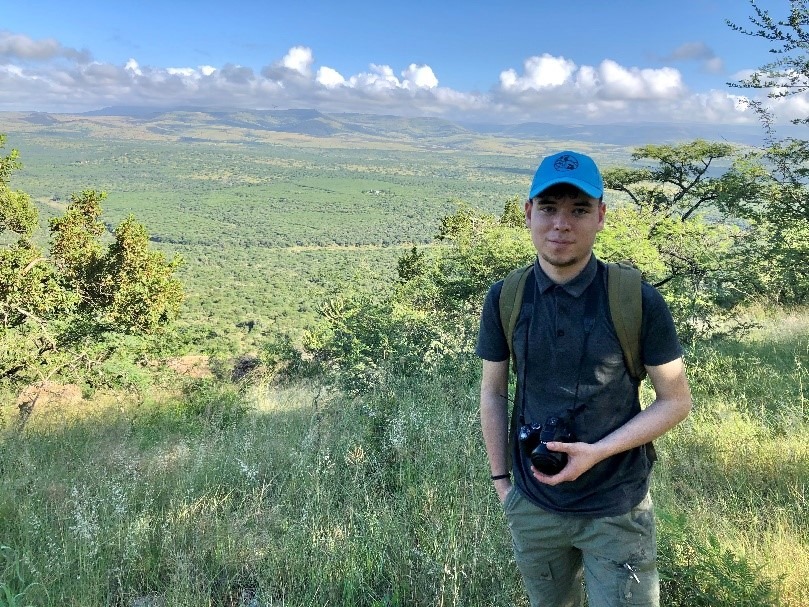Faces of ELSR: Luca Hahn
Humans have always been interested in the behaviour of conspecifics and other animals, but we now live in a time where we study behaviour and cognition as meticulously and systematically as never before. As an inquisitive animal watcher and passionate learner since my childhood, I consider myself as extremely lucky to study animal behaviour. I am fascinated by cognition and sociality in animals, particularly corvids and primates (including humans), but also less commonly studied taxa, such as lizards. My aim is to address scientific questions about behaviour and cognition holistically, i.e. through the lenses of different disciplines, such as behavioural ecology and comparative psychology. More specifically, I am captivated by the ‘social mind’, that is, how organisms navigate their social life by learning from other individuals, by managing their social relationships, and by cooperating and communicating with group members.
I have long been gripped by how animals manoeuvre their environment by means of their minds. During my BSc in Biology and Psychology at the Universities of Cologne, Düsseldorf, and Bielefeld, I was fortunate enough to receive a broad background by specialising in animal behaviour, ecology, and evolution, while also being introduced to experimental psychology and neuroscience. I developed a strong desire to become a researcher in animal behaviour, cognitive science, and evolutionary ecology. For instance, I got involved with research on cognition and personality in both grey mouse lemurs (Microcebus murinus) and fire salamanders (Salamandra salamandra) with Prof. Peter Kappeler and Prof. Barbara Caspers, respectively.
Due to my deep interest in the ecological and evolutionary drivers of animal behaviour I pursued an MSc in Evolutionary and Behavioural Ecology at the University of Exeter. For my MSc thesis I conducted research on animal architecture, and more specifically, cooperative nest building in wild jackdaw pairs (Corvus monedula), as part of Assoc. Prof. Alex Thornton’s Cornish Jackdaw Project and Wild Cognition Research Group. In this context, which may impose cognitive challenges on individuals because they need to coordinate their behaviour, partners cooperated and divided the labour, and the level of cooperative behaviour was linked to fitness proxies. After my MSc, I have been supporting ongoing research on jackdaw behaviour and cognition. Together with two PhD students of the group, we investigate (i) social bonds and cooperation across stages of biparental care and (ii) social learning about novel food. Moreover, I recently moved to South Africa to work as a research assistant for the Inkawu Vervet Project, directed by Prof. Erica van de Waal. In this position I collect long-term data on vervet monkey (Chlorocebus pygerythrus) social behaviour while also assisting in researchers’ behavioural and cognitive experiments.
Ultimately, my long-term goal is to investigate intriguing questions about cognition and social behaviour in wild animals and potentially humans. After having worked with some fantastic mentors already, I am therefore now currently looking and applying for PhD positions on social cognition in wild vertebrate populations, with a particular focus on primates or corvids. Social learning would be a preferred topic for my PhD, and I am also open to investigate other aspects related to cultural evolution, such as social relationships, social intelligence, communication, and cooperation. Science is a calling for me, and therefore my objective and dream would be to do it in the years to come. Please do get in touch!
About the author
Luca completed an MSc in Evolutionary and Behavioural Ecology at the University of Exeter (UK) in 2020 and is now a research assistant for the Inkawu Vervet Project in South Africa, whilst looking for a PhD position in animal social cognition. For his Master’s thesis as part of Dr. Alex Thornton’s Wild Cognition Research Group, he has investigated cooperatively built animal architecture and its link to social relationship strength and fitness consequences, using nest building in wild monogamous jackdaws as a study system. After his MSc, he has been continuing his work with the Cornish Jackdaw Project through research projects on social learning, social relationships, and cooperation. Luca is mainly fascinated by the social mind in animals, and his research interests include topics such as social learning, cultural evolution, communication, social relationships, and cooperation. Based on his passion for animal social cognition, he intends to do a PhD on this topic in wild animal populations.
